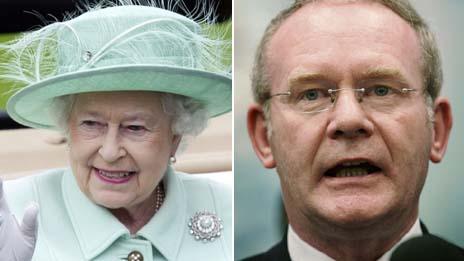Prince Charles to visit scene of Lord Mountbatten's murder
- Published
"It seemed as if the foundations of all we held dear in life had been torn apart irreparably" - Prince Charles
Prince Charles has said the 1979 IRA murder of Lord Mountbatten gave him a profound understanding of how people affected by the Troubles suffered.
The prince will later visit the County Sligo village of Mullaghmore where his great-uncle and three others died.
"I look forward to seeing at last the place that he so loved, and to meeting its inhabitants," he said.
Prince Charles spoke of the compassion shown by people in the area after Lord Mountbatten was killed.
"Their loving kindness has done much to aid the healing process," he told a civic reception.
'Deep loss'
The prince will visit the scene of the IRA explosion on the second day of his four-day visit to the island of Ireland, north and south.
The IRA detonated a bomb on a fishing boat at Mullaghmore on 27 August 1979, killing Lord Mountbatten, his 14-year-old grandson, Nicholas Knatchbull, and 15-year-old Paul Maxwell. The Dowager Lady Brabourne died the day after the attack.
On the same day, 18 British soldiers were killed as two booby-trap bombs exploded beside Narrow Water Castle, near Warrenpoint in County Down.
Speaking ahead of his visit to Mullaghmore, the prince told a civic reception in Sligo: "At the time I could not imagine how we could come to terms with the anguish of such a deep loss, since for me Lord Mountbatten represented the grandfather I never had.
"It seemed as if the foundations of all that we held dear in life had been torn apart irreparably.
"Through this experience, I now understand in a profound way the agonies borne by so many others in these islands, of whatever faith, denomination or political tradition."

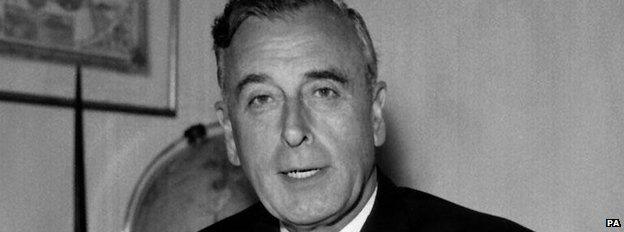
Louis Francis Albert Victor Nicholas Mountbatten was known to family and close friends as Dickie
Who was Lord Mountbatten?
Louis Mountbatten, Earl Mountbatten of Burma, has been described as uncle and godfather to the Prince of Wales. In fact he was neither.
Lord Mountbatten was Prince Charles's great-uncle, through his father. He was also second cousin once removed to the Queen.
His mother was one of the prince's godparents.
As well as his close links to the Royal Family, Lord Mountbatten was a British statesman. He served as the last Viceroy of India and was appointed as the First Sea Lord and Chief of the Defence Staff.
He would spend his summers at Classiebawn castle, overlooking Mullaghmore in County Sligo, a family house of his wife Edwina.

The prince said the island of Ireland had "more than its fair share of turbulence and troubles", and "those directly affected don't easily forget the pain".
"Recent years have shown us though that healing is possible, even when the heartache continues," he said.
Prince Charles spoke of the importance of reconciliation.
"I'm only too deeply aware of the long history of suffering which Ireland has endured, not just in recent decades but over the course of its history," he said.
"It is a history which I know has caused much pain and much resentment, in a world of imperfect human beings, where it is always too easy to overgeneralise and to attribute blame.
"At the end of the day however, we should never forget that our acquaintance has been long, and we can turn that knowing into something new and creative.
"We need no longer be victims of our difficult history with each other."
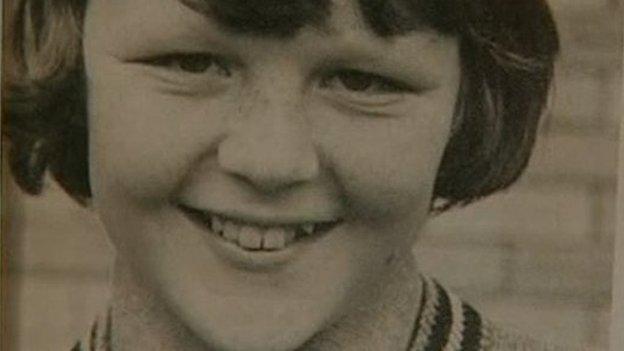
Paul Maxwell was a schoolboy who was working for Lord Mountbatten
During his visit to Mullaghmore, Prince Charles is expected to meet the mother of Paul Maxwell from Enniskillen, County Fermanagh, who had been working on Lord Mountbatten's fishing vessel.
Mary Hornsey said the royal visit was "extending the hand of forgiveness".
Ms Hornsey has not returned to the scene of her son's death since saying "goodbye" to Mullaghmore in 1979 but has decided to accept an invitation to meet Prince Charles on Wednesday.
"I think it is going to be very emotional for me, but I know it has to be done," she told BBC Radio Ulster.
"It is going to be a time of reconciliation and I hope that good will come of it."
'Making a statement'
Ms Hornsey said she felt she had "some kind of bond" with the prince as they had both lost loved ones in the same attack.
"I feel that he is making a statement in coming," she said.
"He is extending the hand of friendship and forgiveness, and I think that is very important. Every little step counts, and when we get more steps it will be even better."
Mary Hornsey: "Prince Charles is extending the hand of friendship"
Recalling her son's murder, Ms Hornsey said it was a "beautiful summer morning" and she and her husband were sitting outside their holiday cottage when the bomb exploded.
"Suddenly there was this almighty bang. I've never heard anything quite like it in my life, and I knew immediately Paul was dead," Ms Hornsey said.
"My husband at the time said: 'Don't be so silly' and he decided to go down to the harbour. He thought perhaps there might have been a gas leak at the castle or something like that. He went down and of course, that great tragedy unfolded."
'Awful price'
She added: "Just knowing he would never be here again - that was awful, so hard."
Ms Hornsey said she constantly thinks about her lost son, the type of man he would have become and how he would have looked after her as she got older.
"I do think that I have become a stronger person because of the awful tragedy, but I have paid an awful price for that," she added.
The prince's visit to Mullaghmore comes a day after he shook hands with the Sinn Féin president Gerry Adams in Galway.
'Significance'
Ms Hornsey described the prince's meeting with Mr Adams as "a very good thing".
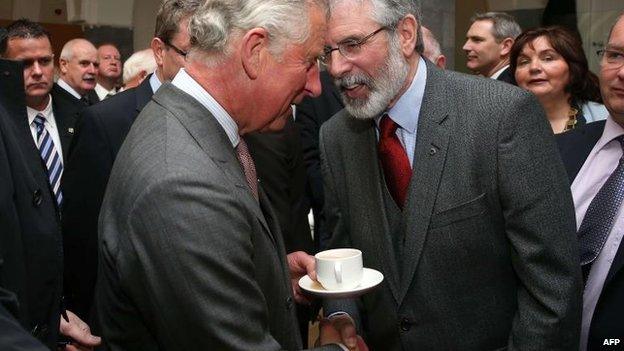
Prince Charles met Sinn Féin leader Gerry Adams in Galway
General Sir Mike Jackson served with the Parachute Regiment, of which Prince Charles is Colonel-in-Chief.
"It would be hard I think to overstate the significance of such a meeting," he said.
"I listened very carefully to Prince Charles' words and they were very moving. And we should remember also it follows on from the Queen's extraordinary state visit to the Republic [of Ireland]."
When asked on BBC's Talkback programme would he be prepared to follow the example of the Prime Minister David Cameron who apologised in parliament for the actions of British paratroopers on Bloody Sunday, Mr Jackson said although he associated himself with what Mr Cameron had said, he said he would fall short of using the word sorry himself.
Tragedies
Fourteen civilians died in 1972 after paratroopers opened fire on crowds during a civil rights demonstration.
Sir Mike said there had been tragedies experienced by both sides during Northern Ireland's Troubles and singled out the killing of 18 British soldiers when two booby-trap bombs exploded beside Narrow Water Castle, near Warrenpoint in County Down.
The attack happened on the same day as the killing of Lord Mountbatten in Mullaghmore.
Speaking after his handshake with Prince Charles, the Sinn Féin leader Gerry Adams said it was "obviously was a big thing for him to do and a big thing for us to do".
After their private meeting, Mr Adams said Prince Charles felt able to empathise with other people who had suffered during the 40 years of violence on the island of Ireland.
"I think it was good that he's come here and I think it's good that he has come to Mullaghmore, and I think it's good that we met," he said.
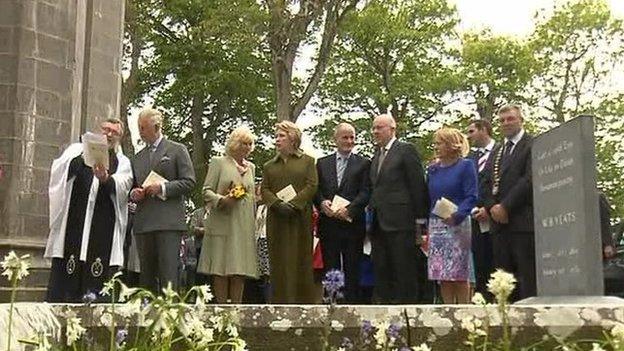
The royal couple visited the grave of Irish poet WB Yeats
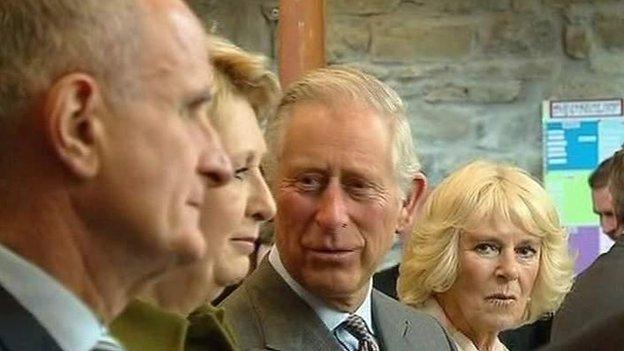
Prince Charles met former Irish President Mary McAleese at a church service on Wednesday
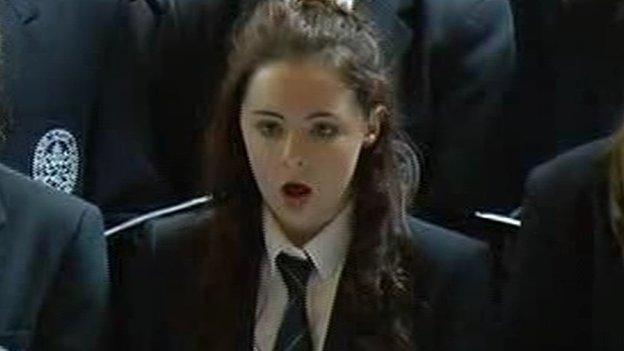
Bethany McLoughlin was part of a choir that sang for Prince Charles in County Sligo
On the second day of the royal couple's visit to the island of Ireland, they have also been attending a service of peace and reconciliation at St Columba's Church in Drumcliffe, where they visited the grave of Irish poet WB Yeats.
Among a choir of secondary school students performing at the ceremony was Bethany McLoughlin, whose grandfather Gerard McKinney was one of 13 people killed by paratroopers in Londonderry during a civil rights march on Bloody Sunday in January 1972.
The 17-year-old Ursuline Convent pupil was chosen by coincidence to join singers from local schools. Her father Gerard McLoughlin said he believed it was an opportunity for further reconciliation.
After the service, Prince Charles planted a tree at the church in memory of Lord Mountbatten.
The prince and the duchess will end the second day of their visit with some horseracing at the Sligo Races.
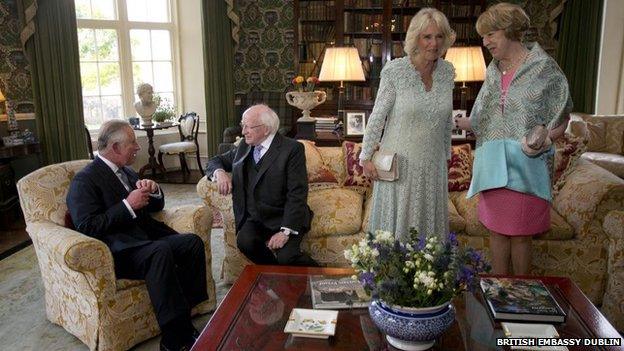
The royal couple dined with Irish President Michael D Higgins and his wife Sabina on Tuesday evening
- Published20 May 2015
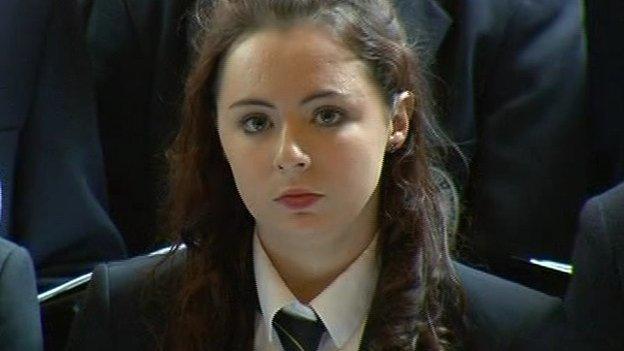
- Published20 May 2015
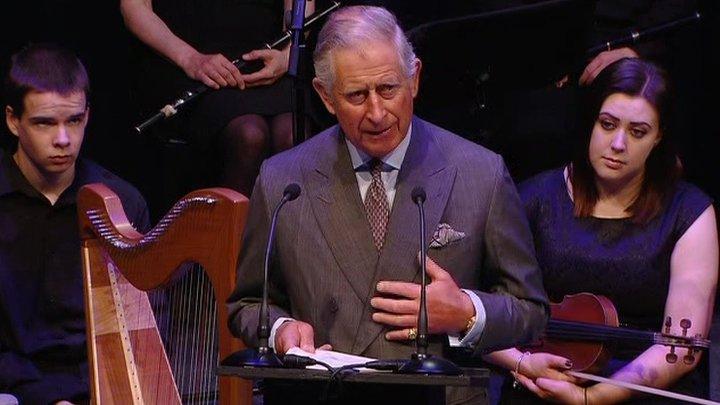
- Published19 May 2015
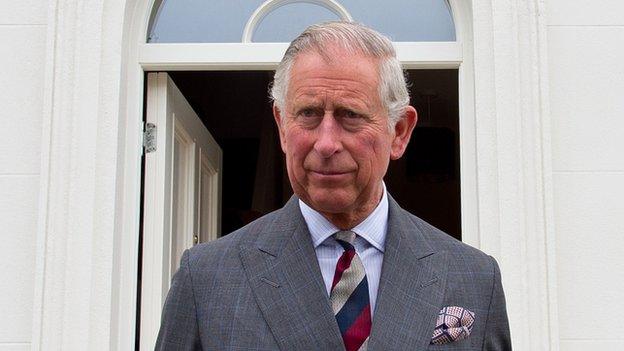
- Published20 May 2015
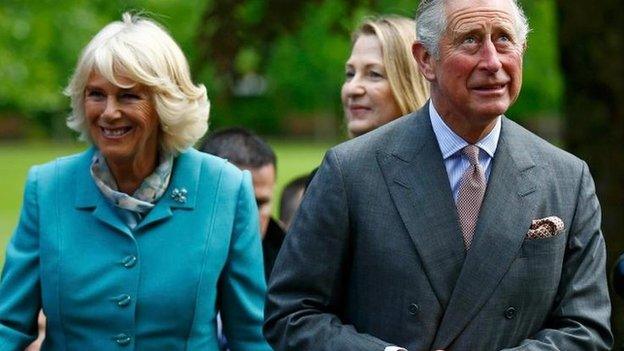
- Published19 May 2015
- Published17 May 2015
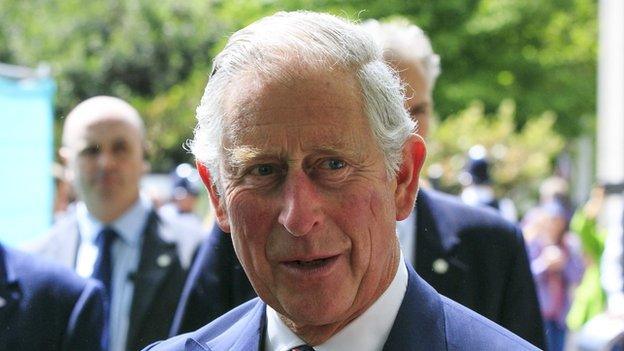
- Published18 May 2015
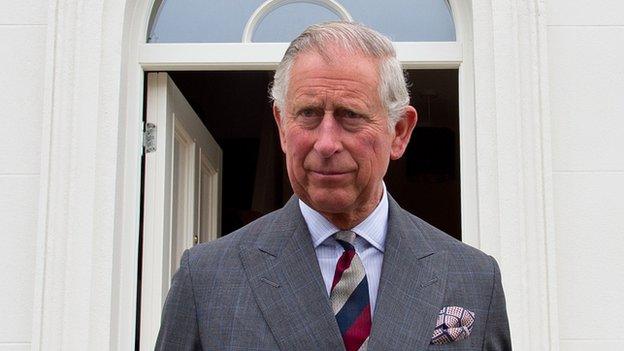
- Published27 June 2012
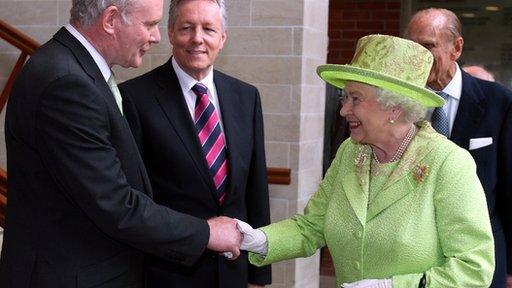
- Published24 June 2012
